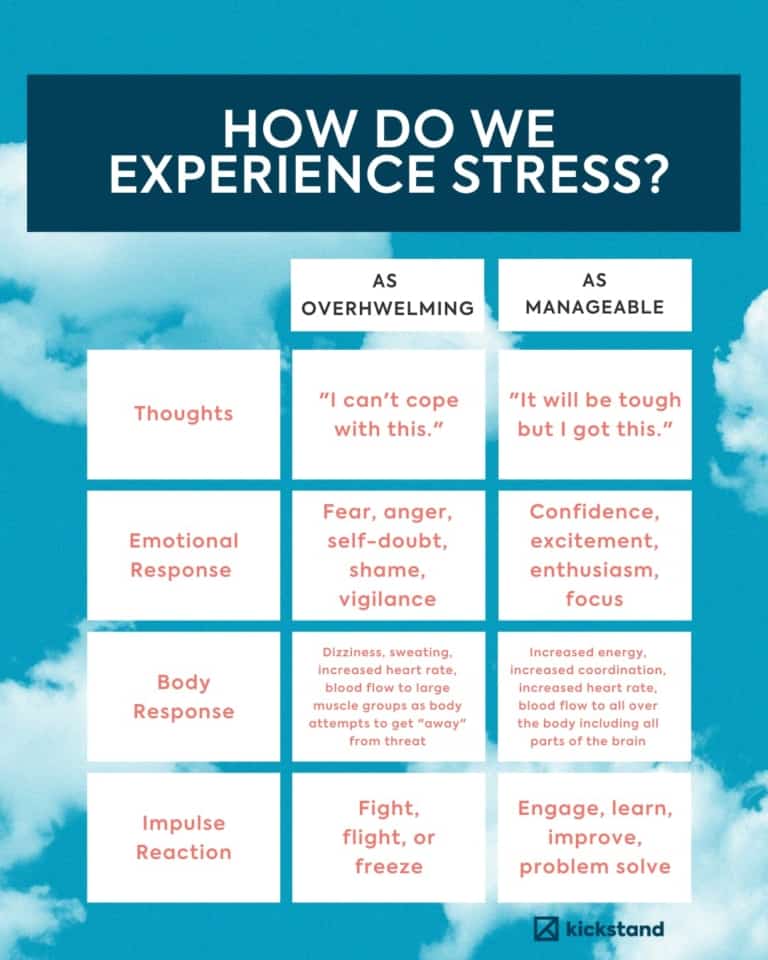What Is Stress?
Stress is a normal part of life. It is the way that our mind and body react to demands or threats that occur around and within us. A stress response can be activated whenever we feel vulnerable, protecting us against possible negative feelings as well as physical harm. Even a remote threat of shame, failure, or loss can trigger a stress response. We all feel it at some point in our daily lives.
Many things in life can cause stress. We may feel stress from external factors (e.g. multiple deadlines from school or work), or from within ourselves (e.g. needing to appear perfect).
Stress can be experienced in two main ways – as overwhelming or as manageable.
| Overwhelming | Manageable | |
|---|---|---|
| Thoughts | "I can't cope with this" | "It will be tough but I got this" |
| Emotional Response | Fear, anger, self-doubt, shame, vigilance | Confidence, excitement, enthusiasm, focus |
| Body Response | Increased heart rate but blood flow is directed to large muscle groups. This is to help with getting away from the threat, dizziness, sweating. | Increased heart rate with blood flow all over the body. This includes all parts of the brain. Increased energy, increased coordination. |
| Impulse Reaction | Fight, flight or freeze | Engage, learn, improve, problem solve |
Stress is an important response for us. It can help motivate us to complete tasks and perform well on something. Stress can also help us accomplish our goals. However, stress can also cause many negative effects. These effects can be physical (headaches, tension in body), emotional (feeling overwhelmed or helpless), or mental (trouble focusing).
While we may not be able to control the amount of stress we face, we can take control of how we react to stress. We can train our minds and bodies to cope better with stress. This can have a big impact on how stress affects us (positively or negatively).
Ways to Manage Stress
There are different ways to improve your reaction to stress in your life and build resiliency. It is helpful to learn how to deal with stress in the moment. It’s also helpful to build skills and practices that are part of your regular day-to-day routines.
Take Time for Yourself
If you are feeling overwhelmed by stress, it can interfere with your ability to handle daily tasks or solve problems. A good option is to take time to “step away” from the problem for a moment. This can help re-set your emotional and body reactions. Doing something enjoyable that distracts you can provide that space to start over again.
- Listen to music you like. Create a playlist of your favorite songs. Or songs that help you feel calm and relaxed. Pop on this playlist when things feel too much.
- Write out your thoughts in a journal. Try to challenge your thinking and negative self talk.
- Get in touch with your creative side. Do a craft or create something.
- Take a break and watch something you enjoy.
- Go for a walk. Enjoy the fresh air and sun.
- Set a goal related to the stressful situation that feels manageable. This can help make an overwhelming situation switch to being manageable.
These strategies are helpful. They can be done in the moment or over a longer-term. If you continue to feel difficulty in managing your stress, there are more long-term ideas! Remember that you might have to try different things to find what works best for you.
Get Moving!
Our physical health is connected with our mental health as well. So getting active and moving your body can help relieve some of the built-up stress or tension. Whether that is putting on your favourite song and dancing in your room or doing a full workout – moving your body can help a lot!
Try Out Some Breathing Exercises
Breathing is a key part of living. It’s something we do without thinking. But it is a vital function for life. We don’t often take time to think about how we breathe. However, deliberately slowing your breathing and taking fuller breaths has been shown to slow your heart rate and lower blood pressure. This can help you feel more relaxed and in control of your emotions.
Some breathing exercises that can help are:
Talk to Someone You Trust
Sometimes it might feel hard to talk to someone about your stress. You might feel embarrassed or feel like your concern is not “big enough” to talk about with someone. However, speaking about your concerns with someone you trust can be a great source of support. Sometimes what can help is to ask yourself this question: “If a friend had a similar problem as I have right now, would I want them to reach out to me?”
Organization
You might find that taking some time to organize things you need to do can be very helpful. To help reach a bigger goal, you can break down what you need to finish each day. This makes tasks more doable and help create a sense of control. Keeping track of the things you have completed and goals that you have met also increases your confidence!
Practicing Mindfulness
Mindfulness is the basic human ability to be fully present. It is to be aware of where we are and what we’re doing. It is can help us to stop being overly reactive or overwhelmed by what’s going on around us. Mindfulness is a quality that every human being already has! It’s not something new you have to learn! It’s just something that you need to practice.
Check out this site Mindfulness for Teens Home – Mindfulness for Teens for more information, videos, and apps that can help you make this a part of your day-to-day life.

Stress is inevitable. Knowing strategies that help your mind and body to positively react to stress are very important. With knowledge and increased practice, you can create a lifestyle where you more consistently manage the ups and downs of life and avoid burnout.
Here are some ways you can include regular stress-management strategies into your routine:
- Take Care of Your Body
Getting enough sleep, eating nutritious foods, and making a workout plan are all ways to help you feel better in general, so you have more energy to handle stressful things. - Schedule Breaks
Schedule time for yourself. Whether that be a few days each week, or an hour every evening, taking time for yourself is essential to having good mental health. - Stay Connected With Others
Having a strong social support group can help us with stress. Friends or family members can be especially helpful in feeling connected and supportive during tough times. - Read Our Page on Self-Care to Learn More!
Check out this page for more information on free youth mental health services that you or a loved one can access through our virtual clinic, Kickstand Connect.
Sources:



